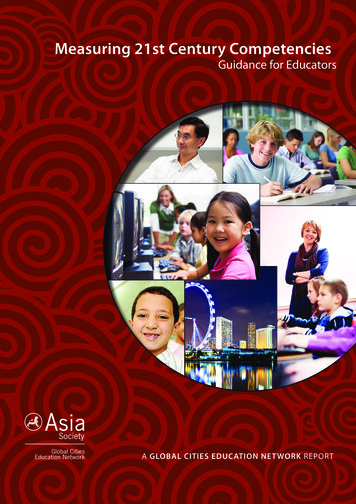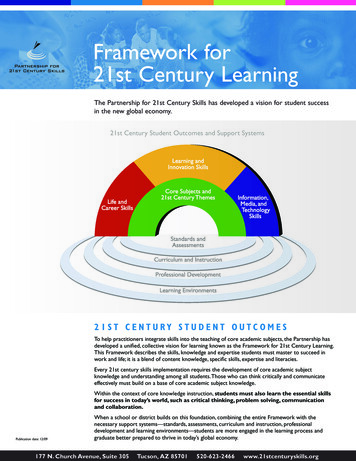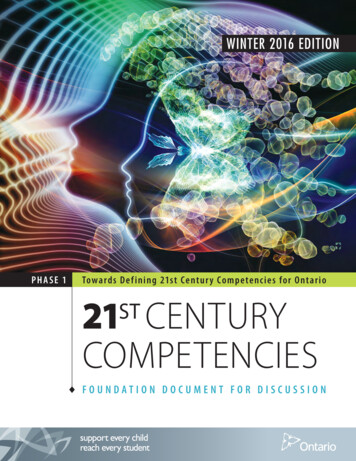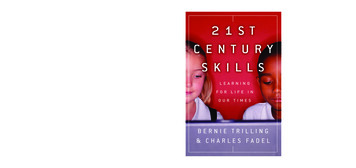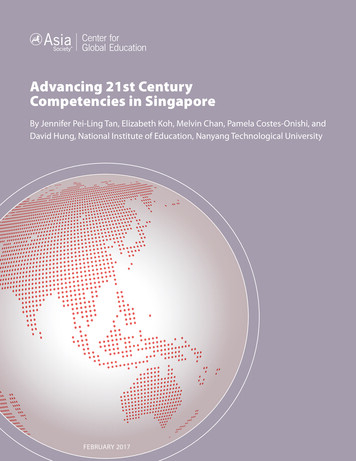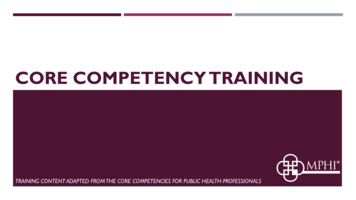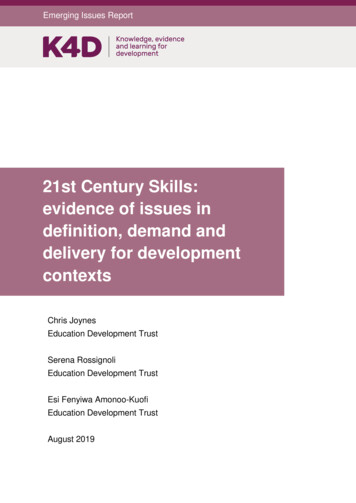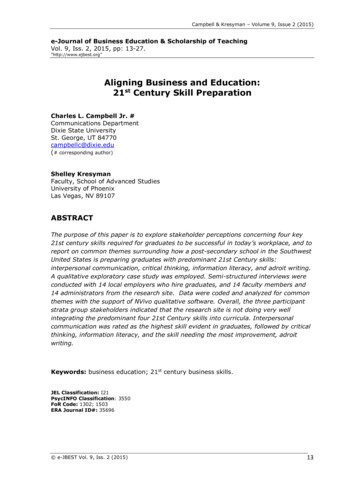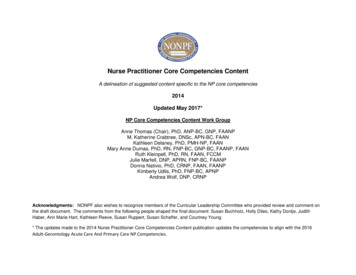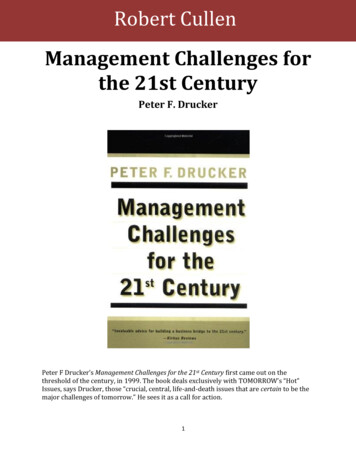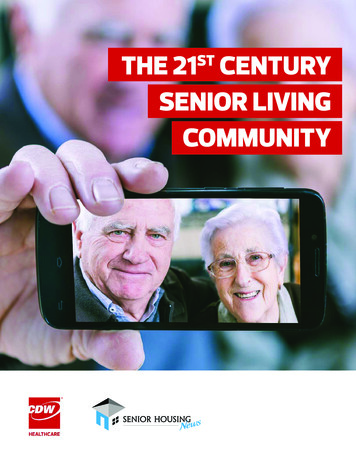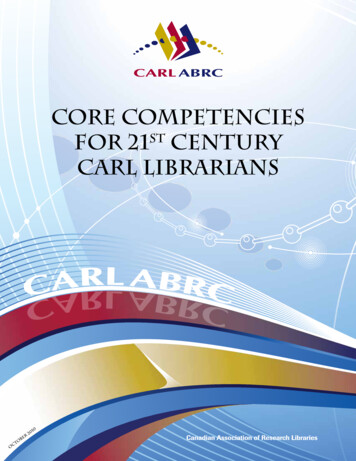
Transcription
Core competenciesfor 21st CenturyCARL librarians10Orbeotc20
2Core competencies for 21st Century CARL librariansTable of Contents34455667778888IntroductionAn Environmental Scan: Challenging Traditional RolesKey Components of the New ModelCompetencies for CARL Librarians1. Foundational Knowledge2. Interpersonal skills3. Leadership and Management4. Collections Development5. Information Literacy6. Research & Contributions to the Profession7. Information Technology SkillsBibliographyCompetency Statements ConsultedOther works citedThis document was developed through the combined efforts ofthe Library Education Working Group and the Building CapacitySubcommittee:Sylvie Belzile (Université de Sherbrooke)Lorraine Busby (Memorial University)Kathleen DeLong (University of Alberta)Joyce Garnett (University of Western Ontario)Margaret Haines (Carleton University)Ernie Ingles (University of Alberta)Vivian Lewis (McMaster University)Cathy Maskell (University of Windsor)Leslie Weir (University of Ottawa)Vicki Williamson (University of Saskatchewan)Diego Argáez (CARL)Katherine McColgan (CARL)Thank you to Sylvie Belzile for assisting with the French translation. 2010 CARL, The content in this document is licensed under theCreative Commons Attribution – NonCommercial – ShareAlike 2.5Canada license.
Core competencies for 21st Century CARL librarians3IntroductionCompetency profiles have been used within manyprofessional groups to help chart professional progressand define goals and objectives. National levelstatements set standards across multiple institutions.Competencies for a profession generally list or group aseries of knowledge, skills, abilities and behaviours thatdefine and contribute to performance. Competenciescan be used to design and develop job postings, positiondescriptions, training and education programmes andperformance evaluation programmes (Federal LibrarianCompetencies, 2008).This competencies profile, commissioned by the CARLBuilding Capacity Subcommittee (formerly the LibraryEducation Working Group, 2006 – 2009), is intendedas a guide to help librarians working in CARL librariesmanage their careers, set meaningful professionaldevelopment goals and align those goals with themissions of their respective organizations. Librarianscan also use this profile to identify strengths and gapsin their personal competencies in order to round outtheir portfolios. Library Directors and human resourceprofessionals, moreover, can employ it as a compass orchecklist of desirable competencies when hiring newlibrarians or when identifying training and developmentopportunities for existing librarians. CARL libraries asa collective can use the competencies profile to marketthe library profession and to recruit new talent.20081. The former Library Education Working Groupwas established with a mandate to create relationshipswith those interested in library education and research,to identify next steps for taking priorities forward, andto identify actions arising from the recommendationsof the 8Rs Canadian Library Human Resources Study2.The 8Rs Canadian Library Human Resource Study wasa national research project that examined key facetsof library human resources from both organizationaland individual perspectives over a period of twoyears (2003 – 2005). The study draws its name fromthe eight core issues that the literature suggests arecentral to library staff management: recruitment,retention, remuneration, reaccreditation, repatriation,rejuvenation, retirement and restructuring.3 This corecompetencies profile addresses the recruitment andrestructuring issues inasmuch as it presents a set ofkey skills, attributes, and attitudes which are suggestedas integral to building and maintaining a nimble staffwhich ably serves its community and continually adaptsto a dynamic, constantly evolving research/informationlandscape.4Insofar as how the guidelines in this profile mayapply to particular institutional settings, individualCARL libraries may place greater or lesser emphasison specific portions of the competencies that follow.The profile attempts to reflect the unique compositionCore competencies for 21st Century CARL librarians of competencies required by academic librariansdraws from other existing librarian competency working in an intense, 21st Century academic researchstatements and from competency research in general environment. The profile was designed specifically(Rocchi, 2008; ARL, 2001; SLA, 2001; Federal for use in Canada but the authors surmise that theLibrary & Information Centre, 2008; ALA, 2008). This basic concepts may also be appropriate in otherdocument also fulfills a recommendation of the CARL technologically-advanced countries.Library Education Working Group’s final report in Mayhttp://www.carl-abrc.ca/projects/human resources/0802-lewg report-e.pdf. In November 2009, the LEWG became the CARLBuilding Capacity Sub-Committee Analysis of the 8Rs study results revealed that CARL library directors consider leadership potential, flexibility towards change,managerial skills, innovativeness, communication skills, specialist skills, technological savvy, people skills and the ability to managea heavy workload to be among the most important competencies for librarians – all of which this profile addresses throughout. [VickyWhitmell, The Future of Human Resources in Canadian Libraries, “the 8Rs Study”: Considerations for the Canadian Association ofResearch Libraries, August 2006 http://www.carl-abrc.ca/projects/scholarly communication/pdf/8rs v.whitmell report rev.pdf]1
4Core competencies for 21st Century CARL librariansAn Environmental Scan: Challenging Traditional RolesThe essential role of the CARL librarian has not changed. Regardless of his or her specific position, the librarian’scentral mandate continues to be bringing information seekers and information sources together. This objectiveremains the same, whether the individual is creating metadata, answering a question at a reference desk, teaching acourse, or constructing a new electronic service.The environment within which CARL librarians execute their core mission, however, has changed dramatically.Researchers are turning away from traditional publishing venues in favour of emerging community-vetted forumsto disseminate data and research findings. Students arrive on campus with their information seeking habits andstrategies already formed, and with experience in a host of new sources and new technologies. Transformativetechnologies and the behaviors they engender have radically changed the creation and distribution of scholarlyjournals, data and other research outputs (Ross and Sennyey, pp. 145-146). Scholars are adapting the ways they teachand the ways they conduct research to a new and ever changing digital information environment (Ibid).The academic library is constantly challenged to remain a vital part of this changing environment. A key part,perhaps the key part, in meeting that challenge is to ensure that librarians’ roles transition to meet evolving needs.New areas of expertise are developing as are new opportunities to provide innovative, value-added services forthe students and researchers in the academic community. Across the country, librarians and academic libraries arereassessing the role of the librarian within the academy and this CARL competency profiles provides a nationalframework to help in that reassessment.Key Components of the New ModelThe work of the 21st Century CARL librarian continuesto be grounded on a solid foundation of professionalpractice. The successful practitioner develops expertisein specific areas, but builds and maintains a strong,well-rounded understanding of the library, the campus,and the larger scholarly communications environment.the library’s central place in campus life by taking theirstory to the entire university community and beyond,when and where appropriate (Dupuis, p. 13). Thisexpectation of strong interpersonal skills is standardpractice for academic librarianship, and it will continueto grow in importanceInterpersonal skills remain as key components ofthe CARL librarian’s arsenal. Traditional skills, likewritten and verbal communication, are still important –but increasing emphasis is being placed on the capacityto create and nurture partnerships, to develop innovativenew programs and to market the library to the campuscommunity. The new academic library practitioner isexpected to be a strong advocate for the Library and itscentral place in the University’s teaching, learning andresearch mission. They connect with administrators andstudent leaders, are often front-and-centre with faculty,and are also increasingly at the table when campuswide IT decisions are made. Librarians advocate forExpectations for competence in management andleadership have increased dramatically. As leaders,academic librarians are expected to influence, motivateand challenge their colleagues and their community toadvance library and institutional goals and objectives.Management skills are no longer expected only ofthose librarians in administrative positions. Rather, alllibrarians should understand the principles of budgetplanning, and facilities, staff and project management.Librarians holding management positions would beexpected to develop their knowledge and skills in theseareas to a higher level, to enable them to effectivelymanage the library and its resources.
Core competencies for 21st Century CARL librariansLibrarians are also taking on new teaching roles withinthe academy. They are partnering with faculty to teachinformation literacy to their students. They are workingwith their instructional technology / teaching supportcentres to enhance the resources available to instructors.They are seeking out, and often earning seats at thetable when key decisions are being made concerninglearning support software and systems. They share withfaculty the interest in helping students use informationefficiently and ethically in a “copy and paste world”(Wilson and Linke).CARL Librarians are increasingly called upon, notjust to support the research of others on campus, butto be researchers in their own right. More and more,academic librarians produce research and scholarlyworks of their own to help them gain better knowledgeof the profession and to contribute back their ownknowledge, skills and experience. Librarians willincreasingly be required to conduct research in order tomeet conditions of employment (i.e., to meet criteria forpromotion and tenure or equivalent). Many factors arecontributing towards this development, perhaps mostnotably the evidence-based librarianship movementthat emphasizes continuous and rigorous assessment asthe foundation for decision making. Some key topics,according to Directors of Canada’s major researchlibraries, are presented in the brochure Librariansas Researchers and Writers: Research Priorities forCanada’s Research Libraries.55http://www.carl-abrc.ca/projects/human resources/writers.pdf5Academic librarians are also carving out new rolesin support of research data management andpreservation on campus. Libraries are not just inthe business of gathering, organizing, and providingaccess to information. They are also actively creatingknowledge, and proactively assisting their institutionsmanage their research outputs as evidenced by thedramatic worldwide growth of institutional repositories.To be successful, librarians must seek out goodpartners. They must focus their attention on creatingrobust infrastructure for long-term data archiving, cleanwork flow tools and policies for describing, managing,sharing, and providing access to the data. Librarianswill also be called upon to take an intermediary role inconnecting multidisciplinary research communities andproviding social software services.21st Century CARL librarians are expected to betechnologically-savvy. They are expected to thrive inthe digital environment. They are expected to be activelyengaged in the exploration and implementation of newtechnologies on their campuses. By implementinga variety of digital web-based projects, initiativesand infrastructures, librarians preserve, extend,and facilitate access to information and knowledgecomprising humankind’s cultural, scientific andintellectual heritage.
6Core competencies for 21st Century CARL librariansCompetencies for CARL LibrariansWith differences in emphasis depending on the nature of individual academic/research librarian positions,the following is presented as a holistic compendium of core competencies for librarians working in an intenseresearch environment.1. Foundational KnowledgeAll CARL librarians should have a strong foundational knowledge of:a. The social, cultural, economic, political, and information environment within which they workb. Librarianship and professional practice The ethics, values and foundational principles of the library and information profession The role of the library in the promotion of intellectual freedom through the development, management andpreservation of the scholarly research recordc.The library or library system within which they work Structure (the divisions, departments, units ) Decision making bodies and processes Advisory committees (do they exist? mandate?) Budget process Key policies and procedures Key collection strengths (subject areas, formats, etc.) Key services for students (undergraduate and graduate), faculty and scholars, the general public)d.The larger institutional organization The campus environment Organizational structure (where does the library fit in?) Institutional decision making bodies and processes Institutional budget process (how is funding allocated within the university?) Institutional mission, goals and objectives includinge. The extra-institutional environment Regional, provincial, national and international organizations that affect library organization and operation(e.g. regional consortial groups, CARL, SPARC, etc.)f. The Canadian higher education environment at various levels Funding processes Regulationg. Scholarly communication models and practices(including institutional repositories, open access journals, data management)h. Legal issues related to the academic library environment Knowledge of copyright (basic understanding of Canadian copyright legislation and how it applies tolibraries – reserves, photocopying, etc.) A knowledge of various license models related to service and resource provision
Core competencies for 21st Century CARL librarians72. Interpersonal SkillsAll CARL librarians should have the following skills: Adaptability, flexibility, and eagerness for new experiences and knowledgeCommunication and advocacy – effectively conveying the importance of libraries to their parent institutions,to their target audiences/constituencies, and advancing the values of the library profession (e.g. empoweringusers to be self-sufficient, freedom of expression, upholding the right to access information and knowledgein all expressions, preserving the corpus of human knowledge for future generations, etc.)Negotiation – working with others to arrive at mutually acceptable/beneficial solutionsChange management – being able to work effectively in the face of ambiguity; open mindedness to changeand adaptation of work habits/behaviour to different conditionsDecision making – making well-informed decisions in a manner that is perceptive of the implications;committing to actions even when faced with uncertainty in order to fulfill organizational goalsProblem solving – identifying problems, determining relevance and accuracy of related information, andusing good judgment to come up with solutions; possessing the ability to manage and resolve conflicts/disagreements in constructive waysInitiative – the capacity to identify issues and to develop and implement solutions to address those issuesInnovation – applying the imagination for the purpose of devising solutions to problems, and designingnew methods/procedures when established ones do not suffice or they are inexistentCollaboration – working with diverse groups, in and out of the library, in pursuit of shared goals and withan appreciation of diverse perspectives; taking the library’s story into the communityMarketing – promoting the expertise, services, collections, and facilities of the library to a varied clientele(e.g., undergraduate students, graduates, and faculty in all disciplines), and making the case to administrationsfor the library as a vital institution in the research enterprise and for teaching and learningMentoring – providing useful advice and feedback to new members of the profession to help them attainsuccess in the field and in their new positionsWriting skills – preparing persuasive grant proposals or reportsPresentation skills – ability to speak in front of an audience – with or without technology3. Leadership and ManagementAll CARL librarians should commit to and develop the following: Leadership – influencing and motivating others to strive for excellence; able to adapt to a variety ofworking/learning styles, scenarios and organizational cultures and to lead change within the organizationFinancial management – understanding the principles of planning and budgeting in academic librariesHuman resources management – understanding the principles of effective personnel practices and humanresource developmentServices and resources development – understanding how to assess the need for and to plan and implementnew services and/or resources in light of current and anticipated needsRisk management – understanding the advantages and disadvantages of any action or decision and beingable to effectively evaluate both to support any decision madeProject management – planning, organizing and managing resources to successfully complete specificproject objectives within a certain time frameAssessment and Evaluation – understanding the concepts and methods for service, resource and projectevaluation and outcomes assessmentPartnerships & Collaborations – understanding the reasons and strategies for developing collaborationsand partnerships with stakeholders and relevant communities
8Core competencies for 21st Century CARL librarians4. Collections DevelopmentAll CARL librarians should have a foundational knowledge of the following: Scholarly publishing cycle – understanding the life cycle of scholarly publishing, from creation throughvarious stages of use to dispositionCollections development and management – understanding the concepts, issues and methods related to theacquisition, and disposition of resources, including knowing collection strengths and library and institutionalgoals and objectives for resource developmentDigital curation6 – understanding best practices for the selection, collection, preservation, description,organization, and archiving principles for digital documentation and research data in various formatsDigital preservation7 – understanding of the principles, activities, policies, procedures, and services forpersistent accessManagement and preservation of collections – basic understanding of the management and preservationmethods for general collections and for rare books and archivesRecords management – understanding how information is organized for easy identification and retrieval,including cataloguing and metadata standards for all formats.5. Information LiteracyAll CARL librarians should have a strong understanding of, and commitment to, the following: 67Information literacy – principles of information literacy in the academic environment, including numericaland data literacyLearning and teaching – knowledge of learning models and strategies as well as relevant teaching pedagogyand models for the academic environmentInstitutional teaching and learning – knowledge of institutional teaching and learning programmes andgoals to effectively connect with stakeholders and integrate information literacy programs as appropriateCritical thinking & lifelong learning – knowledge of the concepts and principles of information literacyincluding the value of integrating critical thinking and lifelong learning into teaching and instructionmethodologiesReference services – knowledge of the principles and techniques of effective reference service that providesaccess to relevant and reliable informationPatron engagement – knowledge of the principles and techniques to effectively interact with users todetermine information needs and when that need has been satisfiedhttp://en.wikipedia.org/wiki/Digital curationReitz, Joan M., ODLIS — Online Dictionary for Library and Information Science http://lu.com/odlis/search.cfm
Core competencies for 21st Century CARL librarians96. Research & Contributions to the ProfessionAll CARL librarians should be knowledgeable of, and commit to, ongoing research and professional developmentthrough the following: Research and publication – contributions through writing, editing, refereeing or reviewing of books,articles or reportsConferences – contributions through presentations to professional or scholarly associations/meetingsFormal study – taken to broaden subject or professional knowledge and may include study for advancedprofessional and/or related academic qualificationsTeaching – teaching courses in areas of librarianship, archives or other academic disciplinesConference management – planning, organizing or conducting professional programs, workshops,seminars or conferencesProfessional Associations – active participation in professional associations which may include holdingexecutive office, serving on committees, etc.Active engagement in community initiatives – especially those associated with their area of professionalor subject expertiseStaying informed – ability to stay abreast of research in a specific area to support a research agenda or tosupport other work as a librarian within the libraryResearch models and methods – knowledge of the fundamentals of qualitative and quantitative researchmethods including the research process (e.g. question formulation, peer review, etc.)Grant writing – knowledge and pursuit of avenues available for grants to facilitate research work7. Information Technology SkillsAll CARL librarians should have strong knowledge and capability in the following: Integrated library systems (ILS) – knowledge of basic structure, content and use of an integrated librarysystemEmerging web technology – knowledge of major trends in web development including online socialnetworking tools (as of 2010, would include Twitter, Facebook, MySpace, etc.)Electronic resources management – knowledge of how digital resources are acquired, managed andaccessedWeb page development – understanding of principles of web page design and maintenanceInstitutional repositories – Understanding the basic structure, content and use of campus institutionalrepositoriesLearning management system (LMS / CMS) – knowledge of the structure and the use of campusLMS / CMSDatabase management – understanding how databases are designed and structured for convenient dataand/or information retrieval
10Core competencies for 21st Century CARL librariansBibliographyCompetency Statements ConsultedAbels, Eileen et al, SLA, Competencies for Information Professionals of the 21st Century, Revised Edition,2003. http://www.sla.org/PDFs/Competencies2003 revised.pdfALA Presidential Task Force on Library Education, ALA’s Core Competencies of Librarianship, fAssociation of Southeastern Research Libraries (ASERL), Shaping the Future : ASERL’s Competencies forResearch Librarians, 2001. tencies.pdfRocchi, Barbara et al, Research & Research Training Paper for the Information Futures Commission, TheUniversity of Melbourne, 2008.http://www.informationfutures.unimelb.edu.au/ data/assets/pdf file/0010/105103/is-research20080509.pdfFederal Library & Information Center Committee (FLICC), Library of Congress, Federal LibrarianCompetencies, 2008. http://www.loc.gov/flicc/publications/Lib Compt/Lib Compt Oct2008.pdfIngles, Ernie et al, The 8Rs Research Team, The Future of Human Resources in Canadian Libraries, braries.pdfOther Works CitedDupuis, John (2009). My Job in Ten Years: the Future of Academic Libraries. Access, Volume 15, Number 711Ross, Lyman and Pongracz, Sennyey (2008). The Library is Dead, Long Live the Library! The practice ofAcademic Librarianship and the Digital Revolution. The Journal of Academic Librarianship, Volume 34, Number 2.Whitmell, Vicky (2006). The Future of Human Resources in Canadian Libraries, “the 8Rs Study”:Considerations for the Canadian Association of Research ly communication/pdf/8rs v.whitmell report rev.pdfWilson, Betsy and Erika Linke (2009). Academic libraries foster key skills in next generation. The SeattleTimes, March 5. 812914 opinc05libraries.htmlCanadian Association of Research LibrariesMorisset Hall, Suite 23965 University Private, Ottawa ON K1N 9A5Telephone: 613.562.5385Facsimile: 613.562.5297Email: carladm@uottawa.cawww.carl-abrc.ca
Core CompetenCies for 21st Century CArL LibrAriAns 3 Competency profileshave been used within many professional groups to help chart professional progress and definegoals and objectives.
